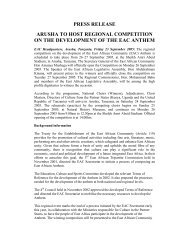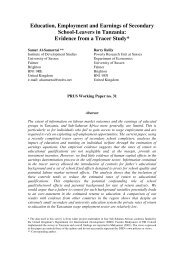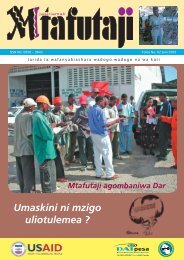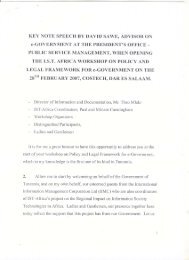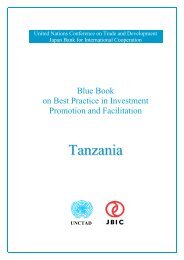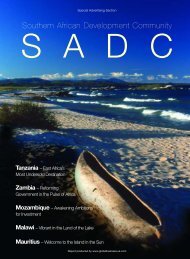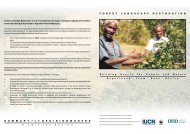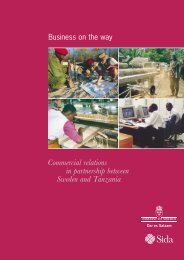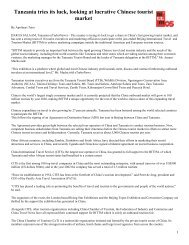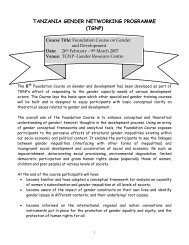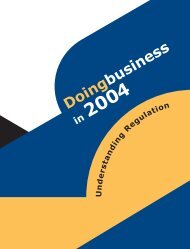Designing e-Government for the Poor - Tanzania Development ...
Designing e-Government for the Poor - Tanzania Development ...
Designing e-Government for the Poor - Tanzania Development ...
Create successful ePaper yourself
Turn your PDF publications into a flip-book with our unique Google optimized e-Paper software.
Enabling local governments to offer e-services to poor citizens:<br />
progress and challenges<br />
(f) ADBI and ESCAP, toge<strong>the</strong>r with <strong>the</strong> private sector, should<br />
play a major role in coordinating <strong>the</strong> development of a roadmap <strong>for</strong> egovernment<br />
<strong>for</strong> each country that is appropriate to <strong>the</strong> development status<br />
of ICT in <strong>the</strong> respective country, and <strong>the</strong> promotion of local language<br />
applications.<br />
II. PROCEEDINGS OF THE WORKSHOP<br />
A. Enabling local governments to offer e-services to<br />
poor citizens: progress and challenges<br />
Mr. Clay G. Westcott, Principal Regional<br />
Cooperation Specialist, ADB<br />
ADB’s Principal Regional Cooperation Specialist, Mr. Clay G.<br />
Westcott, gave <strong>the</strong> opening presentation of <strong>the</strong> Workshop on <strong>the</strong> current<br />
progress and challenges in providing e-services to <strong>the</strong> poor in Asia. He<br />
defined e-government as <strong>the</strong> use of in<strong>for</strong>mation and communications technology<br />
such as computers, mobile phones, radios and television to promote<br />
more efficient and cost-effective government, facilitate more convenient<br />
government services, allow greater public access to in<strong>for</strong>mation, and make<br />
government more accountable to citizens.<br />
Mr. Wescott gave a brief background on ICT progress in <strong>the</strong> Asian<br />
and Pacific region. He said that developing countries need to be careful<br />
about ensuring that <strong>the</strong>y benefit from technological advancements because<br />
much of <strong>the</strong>se technologies originate in developed countries and are not<br />
necessarily shared with developing countries. This is exemplified by <strong>the</strong><br />
inequalities in <strong>the</strong> use of ICT between rich countries and poor countries in<br />
Asia. The Republic of Korea; Hong Kong, China; Japan and China are in<br />
<strong>the</strong> top seven <strong>for</strong> broadband use worldwide. While Hong Kong, China has<br />
2,700 bits of international bandwidth per inhabitant (bpi), <strong>the</strong> Lao People’s<br />
Democratic Republic has only 0.2 bpi, Bangladesh 0.4 bpi, and Iran 15 bpi.<br />
This is a massive difference in potential <strong>for</strong> countries to access <strong>the</strong> Internet.<br />
There are equally wide variations in cost <strong>for</strong> <strong>the</strong> internet access. In terms<br />
of income percentages, it costs 0.2 per cent of <strong>the</strong> monthly income <strong>for</strong> 20<br />
hours use of <strong>the</strong> Internet in Singapore, while it costs 250 per cent of <strong>the</strong><br />
income in Cambodia. In <strong>the</strong> Philippines 27 per cent of <strong>the</strong> population has<br />
access to mobile phones, while in Indonesia it is only 9 per cent of <strong>the</strong><br />
population. Mr. Westcott said that if this gap in mobile penetration between<br />
<strong>the</strong> Philippines and Indonesia continues, <strong>the</strong> result would be a 1 per cent<br />
increase in long term growth rate <strong>for</strong> <strong>the</strong> Philippines. This discrepancy<br />
among countries of <strong>the</strong> Asia and Pacific region is also apparent in <strong>the</strong><br />
United Nations rankings of e-government. Singapore is highest while Palau<br />
is lowest in <strong>the</strong> world.<br />
7



